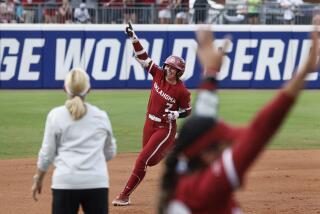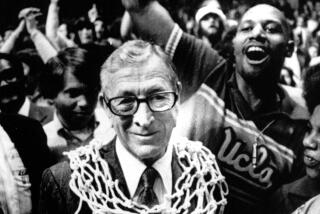SWITZER’S LAND : Oklahoma Coach Is Supposed to Win and He Does--Better Than Anybody
- Share via
It’s not likely that Oklahoma’s Barry Switzer will ever become the all-time top winner among football coaches in the National Collegiate Athletic Assn.’s Division 1-A.
With 150 victories since 1973, he would need to average 10 a season for the next 17 years to close in on Bear Bryant’s record of 323.
And since Switzer will be 51 Oct. 5, time figures to run out on him unless he wants to stay in coaching until he’s in his late 60s.
So Switzer probably will have to be content with being the No.1 winner among active coaches. Switzer, with a 150-26-4 record, has a winning mark of .844, which puts him ahead of such esteemed peers as Tom Osborne, Bo Schembechler, Joe Paterno, Vince Dooley, Terry Donahue, Don James and Jackie Sherrill.
Moreover, Switzer has won 3 national championships in his 15 seasons at Oklahoma. He has never lost more than 4 games in a season and has averaged 9.6 wins. In the last 3 years, his teams have won 33 games while losing only 3--all to Miami.
He has also frustrated Nebraska, the other half of the Big Two in the Big Eight, with 13 victories over the Cornhuskers in their last 17 meetings.
USC Coach Larry Smith, of course, is aware of Switzer’s accomplishments as his Trojans prepare for Saturday’s game with the Sooners at the Coliseum.
Yet, Switzer doesn’t seem to get the recognition that goes to some other coaches. His critics say that he should win with the wealth of talent that pours into Norman, Okla., every season.
Although he is acclaimed as an excellent recruiter, what is often overlooked is Switzer’s background as a sound football coach, one who can scribble X’s and O’s with the best of them.
Bill Connors, sports editor of the Tulsa World, has known Switzer since he was a Sooner assistant coach under Chuck Fairbanks in the late 1960s and early 1970s.
“I think the most significant thing he has ever done in coaching is when Oklahoma switched from the veer to the wishbone in 1970,” Connors said. “Barry was never comfortable with the veer.
“Oklahoma won its first two games in 1970, and then Oregon State came into Norman and won, 23-14. It was a real shocker because Oklahoma wasn’t prepared to lose to Oregon State.
“Switzer said he never felt so sick walking off the field. He said that he knew that Oklahoma had better talent but lost because it was in the wrong offense.
“Oklahoma’s next opponent was Texas, which had won the national championship the previous year and was running the wishbone. Switzer walked into the defensive coaches’ film room and said, ‘This (the wishbone) is what we ought to be doing.’ ”
So Switzer, as offensive coordinator, persuaded Fairbanks to switch to the wishbone. The only problem was that no one on the staff was knowledgeable about the triple-option offense.
Oklahoma’s coaches then studied their own films from previous Texas games.
“Switzer literally lived in the film room, learning that offense, and then he had to teach it to the other assistants, who would teach it to the players,” Connors said.
Oklahoma had an open date after losing to Oregon State, and the Sooner version of the wishbone made its debut in the next game, against the Texas wishbone. The outcome was predictable, Texas winning, 41-9.
“The (other) Oklahoma coaches told me later that they were amazed at the work that Switzer did that season,” Connors said. “They said he wore out the projectors and they didn’t know when he ever slept.”
Frank Broyles, Arkansas’ coach at the time, had Switzer on his staff before Switzer went to Oklahoma. He told Connors that the conversion to the wishbone was the greatest gamble he had ever seen, especially when implemented during the season.
Asked then about the gamble, Switzer said, “I knew if we continued to do what we didn’t believe in, we were going to get fired and if we’re going to get fired, I’d rather be doing something I believed in.”
Switzer’s faith in the new offense was justified. The Sooners had a winning season in 1970, went 11-1 in 1971 and 8-4 in 1972, before Switzer became head coach in 1973.
Only a 7-7 tie with USC marred an otherwise perfect record for Switzer’s ’73 Sooners. And after that game, Oklahoma won 28 straight, taking national championships in 1974 and 1975 in the process.
For all of Switzer’s success as a coach, however, controversy is seldom far away. There was a low point in his life from 1979 to 1983 when his marriage ended in divorce; star tailback Marcus Dupree quit school and he was sued by the Securities and Exchange Commission for his alleged involvement in an insider trading case that was eventually dismissed.
Moreover, the Oklahoma City Oklahoman, the largest newspaper in the state, called for his firing during a period from 1981 to 1983 when his teams lost four games each season.
Recently he has had to respond to charges in a book by his former star linebacker, Brian Bosworth, that he runs a loose ship at Oklahoma, with some players free-basing cocaine.
Switzer denied Bosworth’s allegations, saying that Oklahoma has a functioning anti-drug program and that the charges were baseless.
Oklahoma, however, is being investigated by the NCAA for 16 alleged recruiting infractions.
The main charges stem from Hart Lee Dykes, a wide receiver at Oklahoma State, who told the NCAA that he was offered $1,000 by an assistant coach to attend Oklahoma, and that Sooner players sell their football tickets through an intermediary to automobile dealers, among others.
Switzer has known tough times before, however, and has long been a survivor. He reportedly grew up in poverty in Crossett, Ark. His late father went to prison for bootlegging, and his mother committed suicide when he was a teen-ager.
“My players know my story,” Switzer told the Sporting News. “So when they come to me and talk about problems they think they have, tell me how tough it is, they know by the time I get through there isn’t any way they had it tougher than I had it. I have the leverage of being able to talk about how to compete, overcome, achieve and win and not give up.”
As a head coach, with more demands on his time, it’s doubtful that he is bleary-eyed now from marathon sessions in the film room.
Jim Donnan, Oklahoma’s offensive coordinator, views Switzer now as a president of a corporation.
“He checks in with us to see what we are doing with the game plan,” Donnan told the Sporting News. “ He is looking at kids, seeing where they fit into the future, seeing what we need to do. A lot of people typecast coaches as geniuses. He’s just the most successful coach in America. I look at him as the prototype to winning.”
WINNINGEST ACTIVE DIVISION 1-A COACHES ORDER OF COACHES BASED ON WIN PERCENTAGE
Regular Season Bowls Coach, School Yrs W L T Pct.* W L T Barry Switzer, Okla. 16 150 26 4 .844 8 3 0 Joe Paterno, Penn.St. 23 209 48 2 .811 12 6 1 Tom Osborne, Nebraska 16 148 35 2 .810 8 7 0 Bo Schembechler, Mich. 26 215 63 7 .767 4 11 0 LaVell Edwards, BYU 17 148 50 1 .746 4 8 0 Danny Ford, Clemson 11 78 26 4 .741 4 2 0 Terry Donahue, UCLA 13 101 36 7 .726 6 2 1 Pat Dye, Auburn 15 117 44 3 .723 5 1 1 Vince Dooley, Georgia 25 195 74 10 .717 7 10 2 Bobby Bowden, Florida St. 23 176 70 3 .713 7 3 1
*--Ties computed as half won and half lost, bowl games included.
More to Read
Go beyond the scoreboard
Get the latest on L.A.'s teams in the daily Sports Report newsletter.
You may occasionally receive promotional content from the Los Angeles Times.










